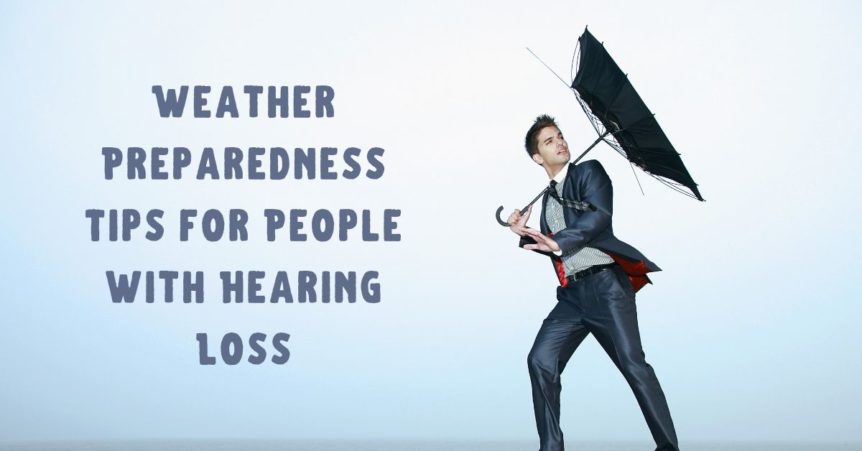Are you prepared for a weather emergency?
If you’re hard of hearing, an emergency can be even more devastating as it affects your ability to communicate. Taking the time to get prepared ahead of time can give you peace of mind, and you’ll know you’re ready for anything that comes your way.
Getting Alerts
When it comes to getting information about emergencies, many people rely on radio or TV broadcasts. If you’re not able to hear clearly, you’ll be left in the dark as to what sort of weather pattern is coming your way, or what you should do about it. Howard A. Rosenblum, chief executive officer of the National Association of the Deaf, stresses the importance of having more accessible alerts, and has been pushing local governments and the media to make alerts visual, and not just rely on sound. “To be fully accessible, any auditory information regarding emergencies and inclement weather should always be provided simultaneously with captioning and sign language,” explains Rosenblum.
Wireless Alerts System
If you struggle to hear, and are afraid you’ll be missing out on important information about weather emergencies, sign up for alerts on your phone. The Wireless Emergency Alert (WEA) system will notify you about any disasters happening in your area, and will use vibrations or flashing lights to make sure you get the message. The Federal Communications Commission’s Wireless Alerts System has been in use since 2012, and has sent out thousands of notifications to Americans across the country. The WEA will send notifications about things happening in your area, such as weather patterns, critical situations, emergencies, and missing children reports. You’ll always be in the know, and will have the information you need to keep you and your family safe.
“Phones are very important, especially during power and/or home internet outages,” explains Norman Williams, senior research engineer at Gallaudet University. “They tend to continue working during the storms unless nearby cellular towers get damaged. Without TV, phone service, power and home internet, it will be tough for deaf people to get information.” Much of our information about storms and preparedness comes from live streaming of the emergency, and if you can’t hear, or your power is off, you won’t have access to this information.
“Communications that are geared towards mobile apps and smart phones are a necessary part of efficient and effective dissemination of emergency and weather information to everyone including deaf and hard-of-hearing individuals as long as the information is provided in all modes including auditory, captioning, and sign language,” Rosenblum said. The Wireless Emergency Alert system should be used by everyone, but if you’re struggling to hear, this system has the power to save your life.
Weather Preparedness Kit
If you’re struck by a weather emergency, you need to be prepared before the storm hits. This is especially important if you’re hard of hearing, and taking a few minutes now to pack a kit can save you a lot of hardship in the event of an emergency, and you’ll know that you have everything you need. For someone who’s struggling to hear, you need to pack a kit that has everything you need in order to communicate.
One of the most important things to have with you in the case of an emergency are your hearing aids! Be sure you’re wearing them during the emergency, and don’t leave them at home. Pack extra batteries, so you’ll have enough power. Take a flashlight so that you won’t have to rely on audio communication, but will be able to see the person talking to you. Put a pad of paper and a pen in the kit as well. If you can’t understand someone, you can ask them to write down instructions on the paper to explain what’s going on, or what you need to do. For weather preparedness, make sure you have a sealed container or bag in your kit, and place your hearing aids in this safe, dry place during the emergency. You can find more packing tips and a full guide from The Vanderbilt Kennedy Center for Excellence in Developmental Disabilities.
Neighborhood Hearing Aid Center
Have you been struggling to hear? Are you worried how this might be affecting your safety? Visit us today at Neighborhood Hearing Aid Center to find out what hearing aids can do for you.

